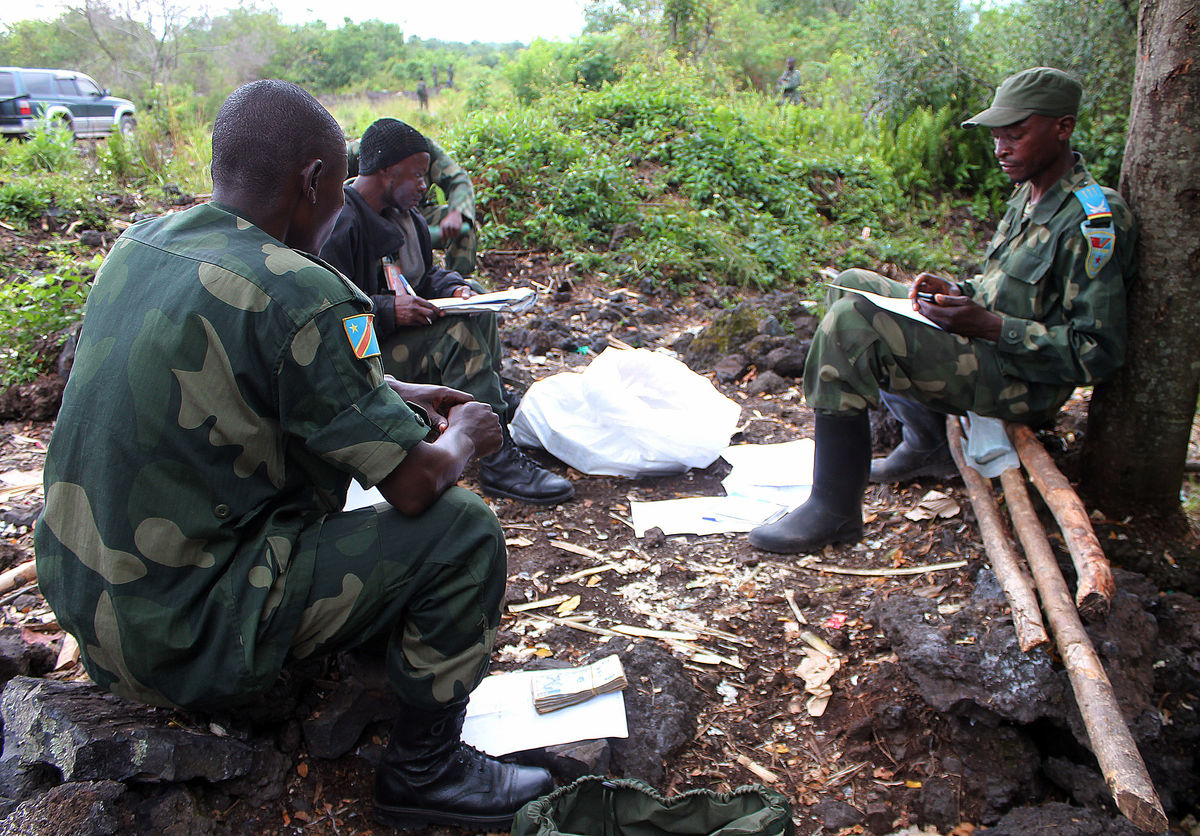Congo, UN Forces Primed for Rebel Offensive as Leaders Meet
January 14, 2015, http://www.bloomberg.com/news/articles/2015-01-14/congo-un-forces-primed-for-offensive-on-rebels-as-leaders-meet
(Bloomberg) –– United Nations and Democratic Republic of Congo forces are preparing for a military offensive against Rwandan rebels in eastern Congo after UN Secretary-General Ban Ki-moon called for “decisive action” against the insurgents.
Lieutenant-General Carlos Alberto Dos Santos Cruz, commander of the UN peacekeeping force, will meet today with South African President Jacob Zuma to discuss the planned attack, Charles Bambara, spokesman for the UN mission in Congo, told reporters in Kinshasa on Jan. 13. South Africa is one of three countries, including Tanzania and Malawi, that contribute soldiers to the 3,000-member Force Intervention Brigade.
The Democratic Forces for the Liberation of Rwanda, or FDLR, has been active in east Congo since fleeing across the Rwandan border after the 1994 genocide. The group, which once numbered as many as 13,000, now has only about 1,400 members. It’s one of as many as 24 rebel groups active in a region rich in tin ore, gold and tantalum, which is used in the batteries of smartphones and laptops.

Defeating the FDLR will send a “strong signal” to the Congolese people and help “boost their sense of security,” said Jean-Jacques Wondo Omanyundu, head of Desc-Wondo, a Belgium-based research group specializing in Congolese political and security matters.
UN and Congolese officials declined to specify when the operations against the FDLR will begin. The group, which comprises former Rwandan government officials, soldiers and refugees, says its using military force to pressure Rwandan authorities into negotiations. According to the UN, the group’s purpose is to overthrow the Rwandan government.
Rwandan Genocide
General David Rodriguez, the head of U.S. Africa Command, met with Congolese President Joseph Kabila, Defense Minister Aime Ngoy Mukena and UN Chief of Mission in Congo Martin Kobler during a two-day visit to Kinshasa that ended yesterday, U.S. embassy spokesman Mike Hackett said in an e-mail yesterday.
“U.S. involvement in operations against the FDLR would be through our robust support for Monusco,” he said. The U.S. provides about $410 million annually to Monusco, Hackett said, and it currently has three military observers serving in Monusco.
The FDLR, some of whose commanders are wanted by the International Criminal Court for their role in the genocide that left at least 800,000 people dead, failed to meet a Jan. 2 deadline set by the International Conference on the Great Lakes Region, the Southern African Development Community and the UN to disarm.
‘Decisive Action’
Ban spoke by phone with Kabila on Jan. 7, urging him to take “decisive action” against the FDLR, according to a statement published on the UN website. Kabila assured him that Congo was ready to take action, the statement showed.
A day later, the Security Council’s 15 members agreed that Congo, with the help of UN peacekeepers, must “neutralize” the FDLR. The surrender of about 300 FDLR combatants in 2014 “was insufficient to end the threat posed by the group,” according to a statement released by the council.
Kobler said efforts by the FDLR to demobilize and repatriate had been neither “credible” nor “sincere.” The UN spent $1.6 million to maintain camps for demobilized FDLR soldiers, though only 357 combatants turned themselves in, Kobler said.
The 20,000-strong UN peacekeeping mission in Congo has supported the Congolese army, known as the FARDC, against various rebel groups in the country throughout the presidency of Kabila, who took office in 2001.
Intervention Force
The Force Intervention Brigade, or FIB, is mandated by the Security Council to carry out offensive operations, a first for the UN. The FIB, in conjunction with Congolese army, will lead the operations against the insurgents, Bambara said.
At stake in the offensive is the credibility of a framework agreement signed in the Ethiopian capital of Addis Ababa in February 2013, Belgium-based Congo analyst Kris Berwouts said in an e-mail.
The accord, drafted by the UN and signed by 11 African nations, resulted in the creation of the FIB and brought pressure to bear on UN and Congolese troops to combat and dismantle rebel groups operating in Congo.
“There’s a lot of pressure on the UN and the FARDC to make progress in that process,” Berwouts said.
M23 Defeat
In 2013, Monusco, as the UN peacekeeping mission is known, helped defeat the M23 rebel group in eastern Congo. Since then, confidence in the mission has waned. More than 88,000 people have been forced to flee their homes in the region since rebel attacks by alleged members of the Uganda-based ADF-NALU insurgents began last October. The ADF says it seeks to implement Sharia law in Uganda.
Protests have been staged against the FARDC and Monusco’s perceived inability to provide adequate security; on several occasions government officials, including Kabila, have appealed publicly for support.
“One thing is clear: the anti-ADF and anti-FDLR operations need support from the population,” Monusco’s military spokesman, Lieutenant-Colonel Felix Prosper Basse, told reporters in Kinshasa, on Jan. 13.
A “triangle of confidence” — between Congolese citizens, Monusco and the FARDC –– is “fundamental,” he said. “It’s a winning combination.”
Basse praised the Congolese army for its role in defeating 80 percent of the ADF in the region since the attacks late last year. “They have only rudimentary means,” he said of the soldiers. “Some of them don’t have shoes. These are courageous men. We must respect them.”
The UN plans to reduce its presence in Congo this year even as it intensifies its military operations. The mission has been in Congo for 15 years.
“We’ll have boots on the ground, patrols,” Kobler said in December. “It will mean more risk, but we’re here to take more risks,” he said, countering criticisms from Congolese civil society groups that Monusco had failed to provide adequate security.

